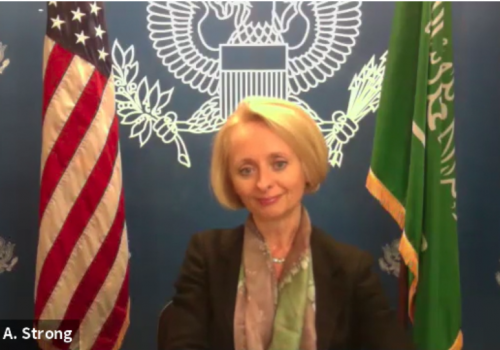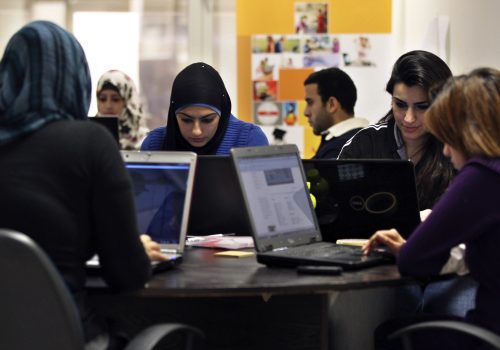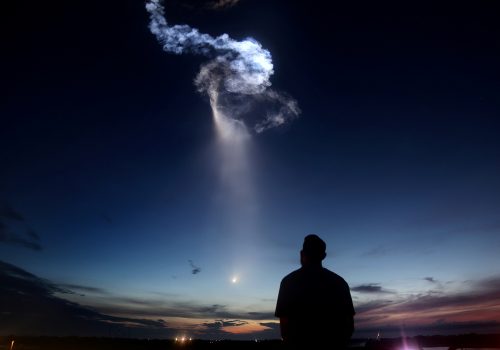Can AgriTech entrepreneurs save the Middle East’s food supply?
On June 9, the Atlantic Council’s GeoTech Center and empowerME Initiative hosted a private, on-the-record roundtable featuring Vita F&B Capital Managing Director Kamel Abdullah, Pure Harvest Smart Farms CEO & Co-Founder Sky Kurtz, and GeoTech Center Nonresident Senior Fellow and Founder of Bold Text Strategies Daniella Taveau, moderated by empowerME Director Amjad Ahmad and GeoTech Center Deputy Director and Senior Fellow Stephanie Wander.
Below is a summary of the discussants’ key points.
AgriTech Innovation
- Wander initiated a conversation tying emerging data capabilities and technologies directly to agriculture and food production: “Data capabilities and new technologies will heavily impact geopolitics, global competition, and global opportunities. The GeoTech Center recently released a new report, which offers practical and implementable recommendations that will enable the world to peacefully employ data capabilities and new technologies for beneficial purposes, including transforming agriculture and food security.”
- Ahmad presented the current state of Agritech in the Middle East and North Africa (MENA): “Given the scarce arable land and water supply, the region’s food security is vulnerable with many highly dependent on imported agricultural products. Add climate changes and rapid urbanization to the mix, and the region represents a ripe environment for innovation.”
- Kurtz emphasized that the Middle East has the opportunity to create food cheaply because it is abundant in the essential resources at the core of food production: sun, CO2, nutrients, water, land, energy, taxation, and capital. In his view, “If you can solve for issues like climate, source capital, and collaborate across all sectors including government, there is an opportunity for MENA to be the cheapest food producer in the world.”
- Abdullah highlighted three areas where we must improve the efficiency of farming: seed technology, to consume less water and sustain plants in higher temperatures; watering technology, to plant with saltwater and reduce evaporation losses; and digital technology, to spotlight the best land areas for planting.
- Abdullah underscored the cross applicability of existing research and development institutions. Governments can incentivize R&D from farmers through payments and, if we connect well-funded local universities with farmers, we can integrate new technologies into the existing marketplace.
- According to Abdullah, “The waste of food in this region is still among the highest in the world. Governments have recognized that they need to mandate a shift in people’s minds about healthy food consumption as important and about food waste patterns. Culturally, our social occasions revolve around abundant food displays which end up being thrown, especially during the holy month of Ramadan. We can use new technologies to convert disposed food into animal feed and partially address this issue.”
- Food loses half of its shelf life before it reaches the supermarket, and supermarkets will not risk selling a product in the last few days, so they throw the food away. Taveau pointed out that inefficiencies at ports are the reason for much of the lost shelf life. Overhauling the ports and streamlining efficiency will be important to preserving the longevity of the food supply.
- To maximize the utility of data, we have to harness existing technology. We don’t need one specific piece of technology designed to capture data from farmers when we have phones that each farmer already possesses. Agromovil CEO and GeoTech Center Non-resident Senior Fellow Andrew Mack emphasized that distributing more technology or resources is not the key to capturing more data—we must maximize the existing technological infrastructure of small-scale farmers.
Investing in Domestic and Local Farming
- Abdullah noted that governments lack major budget services, especially post-pandemic, and cannot maintain exorbitant expenditures on importing food. Governments must create a sustainable agriculture system by supporting local farmers.
- Kurtz added that the private sector is also trending towards local farming. He believes market forces will move us towards a world with more locally produced food.
- Abdullah highlighted that we still have a lot to do to ensure local food production. Supermarkets make the most money because they are closest to the end customer, while the farmer takes on the greatest risk.
- Mack emphasized the importance of protecting local farmers in the marketplace. He pointed out that farmers are going out of business. The average age of a farmer in multiple countries is 58, and they are telling their kids to get a degree and look for a job in another field. There are 1.5 billion people in the farming sector around the world and 570 million of them are small farmers. Small farmers are too important politically and economically to ignore.
- Ahmad added that consumer behavior will drive the capability of agricultural technologies to be relevant, profitable, and investable. He questioned consumer trends and preferences, particularly for locally-sourced fresh products and the willingness of consumers to pay a premium for these products.
- Kurtz responded by pointing out that there has to be someone to sell and buy this stuff from the commercial side. Right now, this trend is highly relevant on socioeconomic disparity. For the middle and upper class, the calories of a product and the knowledge that their food is locally grown is becoming more important.
International and Regional Cooperation
- Taveau argued that we must accept that the MENA region will continue to receive a large amount of their food supply from neighboring countries like India, which is a close ally of many MENA countries and possesses sizeable amounts of arable land. Therefore, food security for the Middle East requires investments in other nations in addition to investing in the region itself.
- According to Taveau, “it is always important, as we are developing greater independence in supply chains, that we ensure independence in a way that is globally-minded. We cannot survive without one another and should resign ourselves to the fact that we will get the greatest food security when we work with our partners.”
- Kurtz emphasized that regional players should continue coordinating their efforts within and beyond the GCC to build a sustainable food market. Adopting technology and improving food production drives profitability, making this shared goal more appealing.
- When describing the importance of cooperation versus competition, Abu Dhabi Investment Office Director General H.E. Dr. Tariq Bin Hendi stressed how critical building partnerships is and how competition between nations is healthy, as it allows for more creative solutions to pressing issues in the AgriTech field.
Recommendations
- Taveau strongly believes that we need long-term economic viability in order to combat food insecurities in the MENA region. Sustained attention is required to progress in tackling this persistent issue. Taveau cautioned that people can be reluctant to accept and adopt new technology. The Agritech industry needs a good, segmented marketing strategy to combat social issues that arise on the path to innovation.
- Abdullah concluded that we must have a method of consumption changes equal to that of production changes.
- From a capital perspective, an individual’s ability to access capital, especially risk capital, is key to developing solutions, commercializing them, and creating new companies that can create jobs and economic prosperity in these countries, said Kurtz.
- Futurity CEO Jack Bobo defined efficiency as “reducing the friction in the system.” This can happen in terms of regulation and technology, as well as across the entire food chain. During the COVID-19 pandemic, efficiency means short-term arrivals when inventory is dwindling. He recommended a balance between slack and reducing friction in the system.
- According to Zuaiter Capital Holdings Managing Member Abbas Zuaiter, long-term investments, such as a thirty-year green bond, could result in investors being more likely to commit and remain in the region.
Hezha Barzani is an intern with Middle East Programs. Matthew Goodman is a consultant with the GeoTech Center. Follow him @matt_goodman22.

Building the GeoTech Decade ahead
The GeoTech Report
The GeoTech Center, in partnership with a bipartisan group of leaders from industry and government, has launched the Report of the Commission of Geopolitical Impacts of New Technologies and Data. This report provides an extensive set of recommendations for the U.S. and its allies to thrive in a decade defined by data and technology collaboration and competition. The report is premised on the arrival of the “GeoTech Decade,” in which new technologies and data capabilities will have an outsized impact on geopolitics, economics, and global governance.




